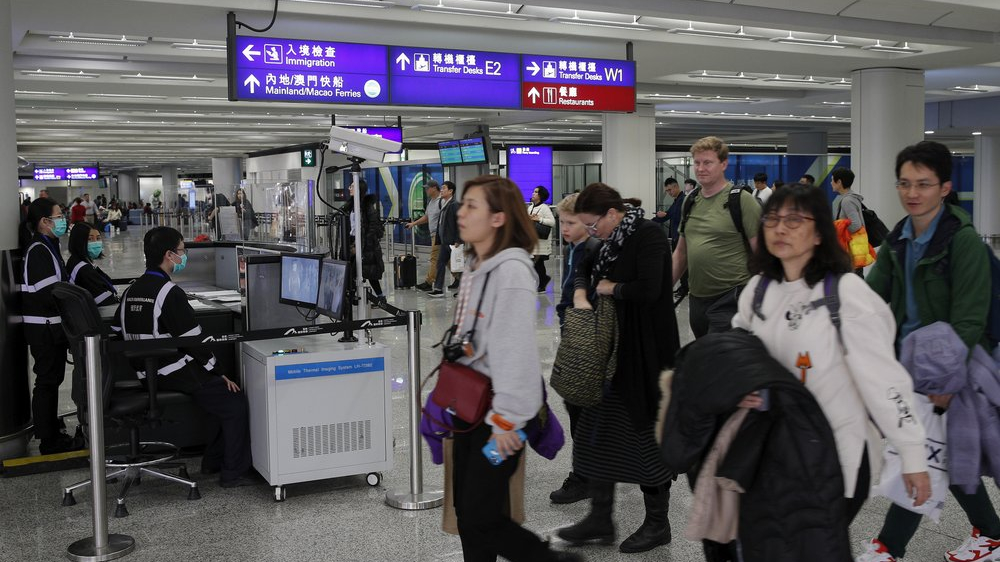
Editor's note: Hannan Hussain is an assistant researcher at the Islamabad Policy Research Institute(IPRI), and an author. The article reflects the author's opinions, and not necessarily the views of CGTN.
By Sunday, Singapore and Hong Kong would have welcomed their first-ever flights under a historic two-way "air travel bubble" – a quarantine-free travel debut that derives its strength from dependable, COVID-19 testing protocols. "The Singapore-Hong Kong Air Travel Bubble enables us to achieve two objectives at the same time – open up our borders in a controlled manner, while maintaining safety in our societies," said Singapore's Minister for Transport Ong Ye Kung in a recent press statement. Through limited passenger strengths, designated air carriers, and internationally recognized COVID-19 containment strategies, both Asian hubs are well-equipped to balance public health safety standards with travel-induced economic progression, inspiring potential advancements in other corridors of the world.
What lends optimism to the Singapore-Hong Kong air travel bubble is the value attached to real-time travel contingencies. For instance, it comes with a "seven-day moving average" suspension provision for COVID-19. So if the weekly average of untraceable COVID-19 cases in either location is found to be more than five, the arrangement would automatically be suspended for two weeks. By setting the benchmark for unlinked COVID-19 cases at a reasonable "five," authorities in both Singapore and Hong Kong neither understate any transmission threat to travelers, nor do they disproportionately exaggerate a distant possibility.
Moreover, joint emphasis on a 72-hour, pre-departure COVID-19 testing requirement spares travelers the challenge of increasingly repetitive measures in the destination city as well. In a significant move, the same requirement also allows both governments to treat each other's pre-administered testing standards as mutually recognizable.
My study of quarantine-free travel arrangements in Oceania has shown that health protocol oversight for incoming travelers is crucial to the success of cross-border mobility under COVID-19. Not only is this mutual oversight the contributing basis for the Singapore-Hong Kong air travel bubble, it is more likely to guide an incremental approach to opening up borders, considering a two-week interval is in place between the time travel commences, and by the time two-way travel becomes routine.

A HK Express airplane is prepared for boarding at Hong Kong International Airport in Hong Kong, China, October 15, 2020. /CFP
A HK Express airplane is prepared for boarding at Hong Kong International Airport in Hong Kong, China, October 15, 2020. /CFP
Note that it wasn't some stroke of sheer desire that compelled Singapore and Hong Kong to agree on a two-way travel bubble system. Rather, both governments' marked success in containing the virus, supplemented by one of the lowest death-rates in the world, proved instrumental to the cause. Between the time that Hong Kong and Singapore reached an "in-principle agreement" on the air-bubble, and the time formal negotiations concluded, Hong Kong reported all of its cases in the single-digit lower range, inclusive of both foreign and local transmission criteria.
During this same interval, Singapore clocked a more than 94-percent decrease in daily reported cases compared to the start of August – a landmark feat by any robust measure. Authorities on both ends have also aligned themselves with automated detection processes, such as computerized health declarations and thermal-imaging cameras, to zero-in on the temperature screening of all incoming visitors.
As a result, significant success in limiting the virus afforded a high degree of confidence to both governments, neither of which overplayed the travel bubble as some premature success story ahead of time. Instead, prospects of success continue to be tailored to ground-realities. "We are proceeding cautiously, but if the arrangement is successful and the pandemic continues to stay under control on both sides, we can look forward to expanding the bubble to more flights, and hopefully, to more destination as well," acknowledged Singapore's Prime Minister Lee Hsien Loong in a social media post.
Interestingly, both governments have argued the initiative's importance by pointing to the future of travel – which is global by design. Travel and tourism made up 10 percent of the global economy last year, with a quantifiable contribution of nearly $9 trillion. That share is projected to drop by nearly a third this year, solely on the back of the on-going COVID-19 pandemic. The International Air Transport Association (IATA) has also warned of the economically disastrous consequences of highly restrictive air-travel measures. "Imposing a quarantine has the same effect as closing borders," said IATA's Regional Vice President for Asia Pacific Conrad Clifford last month. "That is why IATA has called for the systematic testing of all international travelers before departure."
IATA's policy recommendation – to devise a risk-reduction strategy for COVID-19 testing – calls for either less focus on mandatory quarantine vis-à-vis incoming travelers, or its complete elimination. This sensitivity to mobility-driven economic gains and quarantine-free strategic foresight finds its match in the Singapore-Hong Kong bubble, where a newly rolled-out Anti-Epidemic Hygiene Measures Certification Scheme complements Singapore's award-winning SG Clean initiative. Synchronicity between both can back forthcoming, two-way travel opportunities with citywide anti-epidemic safeguards.
A series of countries are also actively engaged with Singapore for subsequent travel arrangements, and nearly a dozen regional governments are already contemplating options with Hong Kong.
Others across the world undoubtedly will watch in anticipation – drawn by the perceived craft and wisdom that could potentially make pandemic-travel sustainable at last.
(If you want to contribute and have specific expertise, please contact us at opinions@cgtn.com.)

